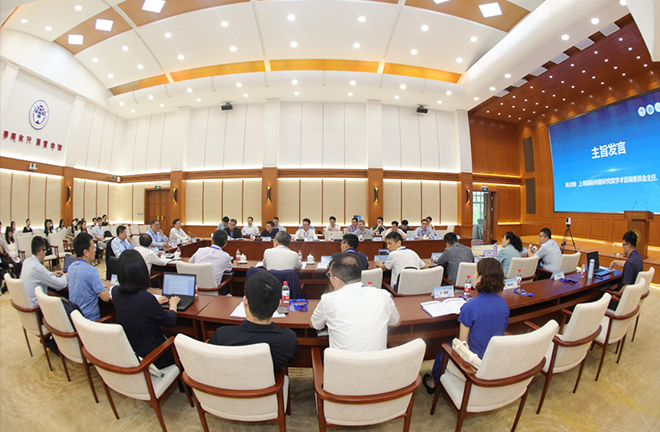Area studies focus on new type of international relations

A seminar on the new type of international relations held in Guangzhou, Guangdong Province Photo: GDUFS
The academic seminar titled “New Type of International Relations from the Perspective of a Community with a Shared Future for Mankind” was recently held in Guangzhou, Guangdong Province. Attendees exchanged views on diplomacy with Chinese characteristics in the new era and the building of a new type of international relations.
Major-country relations
In 2022, area studies was officially established as a first-level discipline under the interdisciplinary category, ushering in a period of rapid development. He Chuantian, vice president of Guangdong University of Foreign Studies (GDUFS), noted that GDUFS had introduced area studies in the 1980s. In recent years, deeper research on Africa, ASEAN, Canada, Indonesia, Latin America, Central and Eastern Europe, and other countries and regions has laid a solid foundation for systematic social service outcomes.
Xu Jian, a professor from the Institute of International Studies at Shandong University, analyzed the theoretical construction of China’s international relations from the perspective of rights politics. He argued that realist power politics is at odds with China’s diplomatic theory and practice, failing to enhance the international community’s understanding of major-country diplomacy with Chinese characteristics. In stark contrast, rights politics aligns with the spirit of the UN Charter and international law, offering academic support for the theory of major-country diplomacy with Chinese characteristics from both the practical and normative levels.
On the path to Chinese modernization, there is a dual task of restarting and reshaping major-country relations, said Cui Hongjian, a professor from the Academy of Regional and Global Governance at Beijing Foreign Studies University. Both China-EU relations and China-US relations need to properly handle the issues of stock and increment. Amid the intricate landscape of China-EU relations, both sides should strive to return to a cooperation-focused trajectory, avoiding the escalation of competitive factors that could lead to confrontation. China-EU strategic mutual trust should be built on the basis of a multi-polar world order and stable major-country politics.
Since 2023, the European Commission has issued a series of strategic documents on economic security, highlighting the importance it attaches to economic security. Ding Chun, a professor from the Institute of World Economy at Fudan University, noted that China-EU economic and trade relations have cooled from a high point, with increasing friction even as bilateral trade continues to develop. The recalibration of the EU’s economic and trade ties with China is a reaction to significant shifts on the global stage, with bilateral relations being influenced by the broader international landscape. The overall trend of China-EU economic and trade relations reflects the coexistence of competition and cooperation.
Chen Hanxi, a professor from the School of International Relations at GDUFS, highlighted the gaps of exchanges between China and the United States at both the academic and official levels. China’s stance, characterized by positive intentions, seeks not to challenge the existing international order but to advocate for moral equality and equal rights. Nonetheless, the United States maintains a contrasting perspective.
Chinese proposals
Liu Jisen, director of the Institute of African Studies at GDUFS, emphasized the principle of extensive consultation, joint contribution, and shared benefits in ensuring that the achievements of the Belt and Road Initiative benefit more people and foster a closer community with a shared future between China and Africa.
In recent years, China’s peripheral security circumstances have changed. In the view of Wang Dong, a professor from the School of International Studies at Peking University, the Global Security Initiative (GSI) represents China’s proactive response to international security challenges, emphasizing security in specific domains and the dialectical relationship between development and security. The GSI seeks to enhance the United Nations’ central role in the global governance system, proactively construct a strategic narrative for global security initiatives, and conform to the characteristics of incremental and flexible development in international security cooperation. In essence, it represents China’s solution to addressing global governance challenges.
Changes in peripheral security have generated multiple impacts on the construction of a community with a shared future for neighboring countries, echoed Zhou Fangyin, deputy director of the Guangdong Institute for International Strategies at GDUFS. Despite this, China can still enhance the certainty of state-to-state relations through stable cooperation and demonstrate a firm attitude towards building a neighborhood community with a shared future through signaling behavior. These efforts serve to avoid excessive interference of regional security in regional development.
The conference was co-sponsored by the Academy of International and Regional Studies and the School of International Relations at GDUFS.
Edited by YANG LANLAN

 PRINT
PRINT CLOSE
CLOSE